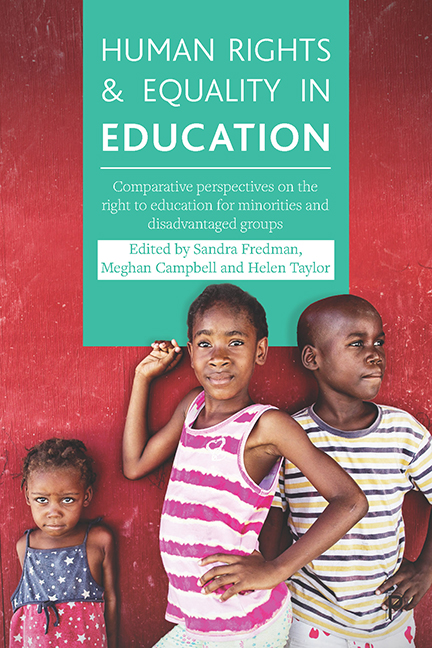 Human Rights and Equality in Education
Human Rights and Equality in Education Book contents
- Frontmatter
- Contents
- Notes on contributors
- Foreword
- Human rights and equality in education: Introduction
- Part I The role of public and private actors in education
- Part II Balancing the right to freedom of religion and culture and the right to education
- Part III Gender equality in education: moving beyond access to primary education
- Part IV Litigating for quality and equality in education
- Index
ten - Human rights and equality in education: Conclusion
Published online by Cambridge University Press: 19 April 2022
- Frontmatter
- Contents
- Notes on contributors
- Foreword
- Human rights and equality in education: Introduction
- Part I The role of public and private actors in education
- Part II Balancing the right to freedom of religion and culture and the right to education
- Part III Gender equality in education: moving beyond access to primary education
- Part IV Litigating for quality and equality in education
- Index
Summary
This collection of essays has explored a range of challenges faced by minorities and disadvantaged groups in education. The book demonstrates how a human rights-based approach brings these challenges into sharper focus and offers a framework for addressing them so that we can achieve quality education for all. These insights are enriched through the comparative perspective provided by the range of jurisdictions featured in the collection. Such a perspective highlights the complexity of the challenges faced and presents contextualised responses to them. Human rights provide a common language to share and compare the experiences of minorities and disadvantaged groups in education. While requiring sensitive attention to be given to how these experiences are embedded in particular contexts, a comparative perspective also enables resonances to be felt across contextual divides. It is therefore capable of inspiring new ideas for overcoming long-standing challenges in education.
An increasingly pressing challenge faced by a human rights-based approach, covered in Part I of this collection, is the question of how to hold actors other than the state accountable for providing quality education to all. While remaining open to the potential benefits of private educational initiatives for disadvantaged and marginalised children who might lose out in the public school system (Smuts), the accountability deficit associated with the involvement of private actors in education needs to be addressed. This accountability deficit leaves minorities and disadvantaged groups most at risk that their right to education will not be realised, and the challenge moving forward is to develop robust accountability mechanisms for ensuring both the state and private actors uphold children's rights to and in education (O’Mahony).
Part II emphasised the importance of sensitive balancing of competing rights and interests in education, particularly with respect to the tension that often arises between the right to education and the freedom of religion and culture. An especially important insight offered by both chapters in Part II is that this balancing exercise requires acute awareness of the contextual and historical positioning of minority groups within the education system. While a human rights-based approach calls for protections to be extended to minorities and disadvantaged groups to ensure they are not marginalised by the education system, we should remain alert to such protections being subverted by groups seeking minority status in order to exclude other groups (Kothari) or being abused in order to preserve historical privilege or restrict access to education (Bishop).
- Type
- Chapter
- Information
- Human Rights and Equality in EducationComparative Perspectives on the Right to Education for Minorities and Disadvantaged Groups, pp. 169 - 172Publisher: Bristol University PressPrint publication year: 2018
